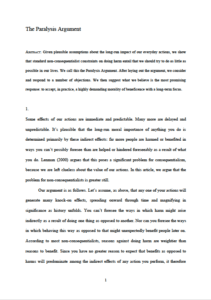The paralysis argument
William MacAskill, Andreas Mogensen (Global Priorities Institute, Oxford University)
GPI Working Paper No. 6-2019, published in Philosophers’ Imprint
Given plausible assumptions about the long-run impact of our everyday actions, we show that standard non-consequentialist constraints on doing harm entail that we should try to do as little as possible in our lives. We call this the Paralysis Argument. After laying out the argument, we consider and respond to a number of objections. We then suggest what we believe is the most promising response: to accept, in practice, a highly demanding morality of beneficence with a long-term focus.
Other working papers
Tough enough? Robust satisficing as a decision norm for long-term policy analysis – Andreas Mogensen and David Thorstad (Global Priorities Institute, Oxford University)
This paper aims to open a dialogue between philosophers working in decision theory and operations researchers and engineers whose research addresses the topic of decision making under deep uncertainty. Specifically, we assess the recommendation to follow a norm of robust satisficing when making decisions under deep uncertainty in the context of decision analyses that rely on the tools of Robust Decision Making developed by Robert Lempert and colleagues at RAND …
- « Previous
- 1
- …
- 27
- 28
- 29

